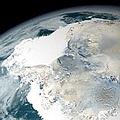 美國太空總署科學家證實,地球上最珍貴的冰雪極地含水量,將因氣候暖化而有所改變。在覆蓋格陵蘭島和南極洲的巨大冰層,科學家已做過相當廣泛的勘測,勘測的結果顯示,已有大量的冰融化進入海洋,而科學家也推斷,格陵蘭島的冰層恐將在本世紀末時,出現無法挽救的消退現象。
美國太空總署科學家證實,地球上最珍貴的冰雪極地含水量,將因氣候暖化而有所改變。在覆蓋格陵蘭島和南極洲的巨大冰層,科學家已做過相當廣泛的勘測,勘測的結果顯示,已有大量的冰融化進入海洋,而科學家也推斷,格陵蘭島的冰層恐將在本世紀末時,出現無法挽救的消退現象。
這項為期10年的調查顯示,在1992至2002年間南北兩極的薄冰層有淨損失,同時海平面也對應此現象而上升。過去這10年每年有淨重達200億公噸融化的水流入海裡,這個數字和每年紐約、紐澤西和維吉尼亞州的家庭、工業和農業用水等量。
此研究紀錄到南極西方冰層的大規模薄化,而格陵蘭內陸雖然降雪增加,島緣的冰層卻同時變薄。
「如果我們目前所見的趨勢繼續下去,且氣候暖化也如預期持續,那麼兩極冰層將會產生劇烈變化,」馬里蘭州綠帶市NASA戈德飛行中心的調查計畫主持人華利表示。華利警告:「到本世紀末結束時,格陵蘭的冰層可能後退到無法回復的狀態。」
2005年全球地表平均溫度實際上和1998年的溫度差不多──是1880年有紀錄以來氣象史上最熱的一年,。1880年是全世界能利用可靠儀器開始偵測氣溫最早的一年。
2005年破紀錄的熱度其實是長期暖化趨勢的一部分現象,由於燃燒化石燃料和砍伐森林等人類活動而造成地球大氣層裡的保熱氣體增加,因而引起氣候暖化。紀錄上最熱的20年中有19年都發生在1980年後。
Climate warming is changing how much water remains in Earth's greatest treasuries of ice and snow, NASA scientists have confirmed. The most comprehensive survey ever undertaken of the enormous ice sheets covering both Greenland and Antarctica shows a net loss of ice to the sea and projects that the Greenland ice sheet could be facing an irreversible decline by the end of the century.
The 10 year survey shows there was a net loss of ice from the combined polar ice sheets between 1992 and 2002 and a corresponding rise in sea level. The 20 billion net tons of water melted into the oceans each of those 10 years is equivalent to the amount of fresh water annually used in homes, businesses, and farming in New York, New Jersey, and Virginia.
The survey documented extensive thinning of the West Antarctic ice shelves, an increase in snowfall in the interior of Greenland, and thinning of ice at the edges.
"If the trends we're seeing continue and climate warming continues as predicted, the polar ice sheets could change dramatically," said survey lead author Dr. H. Jay Zwally of NASA's Goddard Space Flight Center in Greenbelt, Maryland. "The Greenland ice sheet could be facing an irreversible decline by the end of the century," Zwally warned.
Global average surface temperatures in 2005 were virtually identical with those of 1998 - the hottest year on record since 1880, the earliest year for which reliable instrumental records were available worldwide.
The record heat of 2005 is part of a longer term warming trend due to the rise of heat-trapping gases in Earth's atmosphere that is due to human activities - burning fossil fuels and clearing forests. Nineteen of the hottest 20 years on record have occurred since 1980.


